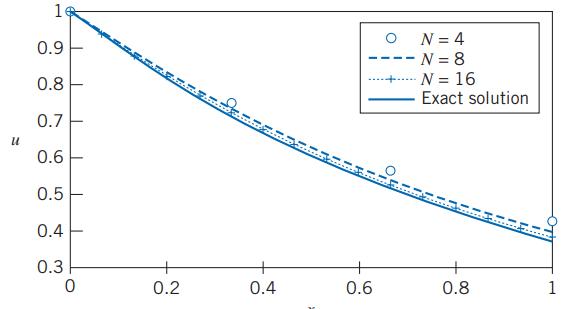Use Excel to generate the solution of Eq. 5.31 for (m=1) shown in Fig. 5.18 To do
Question:
Use Excel to generate the solution of Eq. 5.31 for \(m=1\) shown in Fig. 5.18 To do so, you need to learn how to perform linear algebra in Excel. For example, for \(N=4\) you will end up with the matrix equation of Eq. 5.37. To solve this equation for the \(u\) values, you will have to compute the inverse of the \(4 \times 4\) matrix, and then multiply this inverse into the \(4 \times 1\) matrix on the right of the equation. In Excel, to do array operations, you must use the following rules: Pre-select the cells that will contain the result; use the appropriate Excel array function (look at Excel's Help for details); press Ctrl + Shift + Enter, not just Enter. For example, to invert the \(4 \times 4\) matrix you would: preselect a blank \(4 \times 4\) array that will contain the inverse matrix; type \(=\) minverse \(([\) array containing matrix to be inverted \(])\); press \(\mathrm{Ctrl}+\) Shift + Enter. To multiply a \(4 \times 4\) matrix into a \(4 \times 1\) matrix you would do the following: pre-select a blank \(4 \times 1\) array that will contain the result; type \(=\operatorname{mmult}([\) array containing \(4 \times 4\) matrix \(]\), [array containing \(4 \times 1\) matrix]); press Ctrl + Shift + Enter.
Data From Equation 5.37

Data From Equation 5.31

Data From Fig. 5.18

Step by Step Answer:

Fox And McDonald's Introduction To Fluid Mechanics
ISBN: 9781118912652
9th Edition
Authors: Philip J. Pritchard, John W. Mitchell





